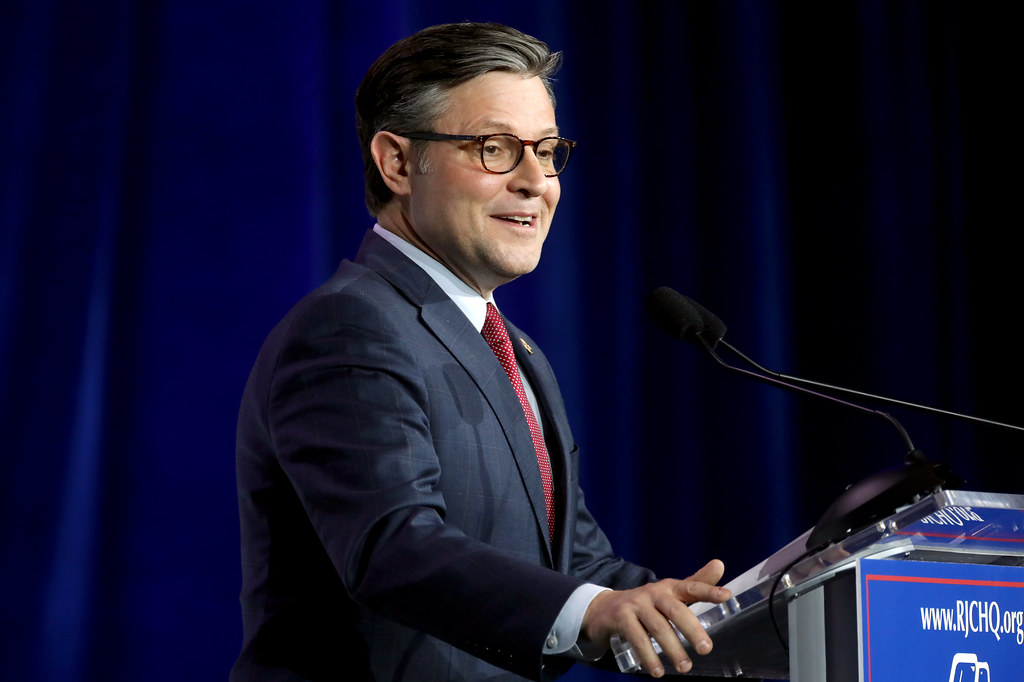Since the late 1970s, America’s political horseshoe has become more and more like a circle, with voters on either end of the spectrum being pushed farther and farther to ideological extremes. Unsurprisingly, the extreme partisanship of the American voter base can largely be attributed to the growing over-politicization of the federal government—or at least one party within the federal government.
The recent appointment of Mike Johnson, a known climate change denier and vocal creationist, as Speaker of the House of Representatives ties a perfect bow on one aspect of America’s political landscape: it is moving so far right that it could fall off the horseshoe altogether. Despite leaders from across the political spectrum advocating for moderation in both parties, the issue of polarization cannot be equally attributed to both sides of the political aisle. Rather, it is the increasingly rightward shift of the Republican party—a party that no longer represents the same values and ideas it once did 30 years ago—that has largely driven modern polarization. The disproportionate right-wing shift started in the early 1970s, a time of immense political turmoil with the Watergate scandal undermining many Americans’ faith in their government. As a result, more Republicans with strong anti-government ideals were elected, transforming the party from a moderate-to-conservative party into an explicitly conservative one.
However, the trend didn’t stop there. The party continued to see new right-wing movements arise, with the Republican Revolution in 1994, the Tea Party Movement during the Obama presidency, and, most recently, the MAGA movement. The shift was empirically confirmed in a recent study that measured political change on a shifting scale. On this scale, the Democratic Party shifted a mere 6 points to the left from the 1970s while the Republican Party shifted a substantial 28 points to the right. The widening gap between the parties was not driven equally by both sides but rather by the growing conservatism within the Republican party.
A clear indication of the party’s move towards extremism has been enormous conflict over the speakership. When the Republican party took control of the House of Representatives in 2023, Kevin McCarthy was seen as the obvious choice for Speaker—having led the party for 4 years. However, when McCarthy sought election, he encountered significant resistance from the growing and persistent far-right faction within the party. Only after 15 rounds of voting and significant concessions to the far right did McCarthy finally secure the speakership, demonstrating who really held power in the party.
Despite these concessions, McCarthy’s tenure as speaker proved to be short-lived. He was ousted by the right-wing faction in Congress for committing the apparent ultimate sin: working with the President on a bipartisan bill to prevent a government shutdown. With this, the party entered into a schism between the remaining moderate forces and the growing far-right ranks: a conflict which was won by the far right.
On Oct. 25, Louisiana Congressman Mike Johnson became McCarthy’s successor as Speaker of the House of Representatives despite only small minority of Republican voters actually supporting his political stances—reasonable figure given Johnson’s extreme political views. Johnson is one of the most vocal gender extremists, anti-gay activists, and climate change deniers. In fact, when working as a lawyer, Johnson actively pushed to uphold Louisiana’s criminal ban on gay sex. But his problematic views don’t end there. Even after Trump’s claims of a rigged election were widely discredited, Mike Johnson was still an active participant in trying to overturn the election.
During the election for Speaker, Johnson won the majority vote with all but one Republican vote. While the vote can be partially explained by the desperation of Republicans to elect someone, anyone as speaker, it nevertheless demonstrates the growing extremism of elected Republicans and their growing distance from the American electorate. This mass support for someone who not only denies gender and sexual equality but is also willing to burn this nation’s democratic ideals on the pyre of patriotism alludes to the extremist power in the current right-wing political landscape. What was once a party defined by laissez-faire economics and social conservatism has now shifted to label itself with a name tag reading “socially prejudiced and overtly bigoted.”
The appointment of Mike Johnson as Speaker of the House is simply yet another indicator of the growing trend of polarization within American politics. Because the Republican party has been actively shifting away from its moderately conservative roots, it has largely been responsible for the severe partisan divide in America’s voter base today. Although we probably won’t see a decrease in political polarization soon, we, as future voters, can still hope for a political cease-fire encouraged by centrist politicians and current liberal voices in the political sphere.

